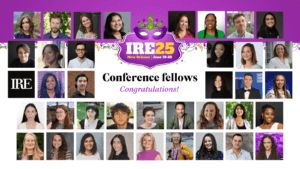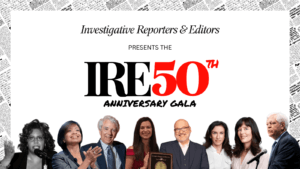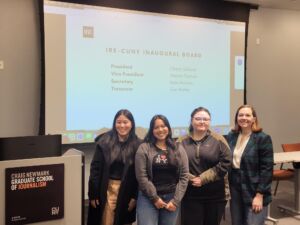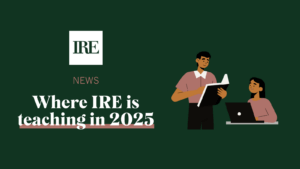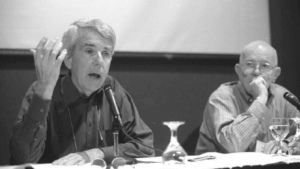Posts by IRE Admin
IRE’s AccessFest Conference returns online this October
The 2025 IRE Conference will take place online Oct. 9-11. This IRE conference is virtual by design, created with the goal of expanding IRE training to journalists around the world in a more accessible and affordable format.
Read MoreIntroducing the 2025 IRE Conference fellows
Thanks to the help of our generous sponsors and donors, IRE was able to offer more than 60 fellowships to help journalists and students attend the 2025 IRE Conference.
Read MoreIRE hosts golden gala celebrating spirit of investigative journalism
Investigative Reporters and Editors will mark its 50th anniversary with a gala in September, an elegant evening of camaraderie and entertainment paying tribute to the outrage that has driven investigative journalism since 1975.
Read MoreIRE launches pilot program on college campuses
A pilot program of IRE student chapters is in place across the country. The goal is to introduce more students to the organization and bring investigative training to college campuses.
Read MoreJoin the legacy: Shining a spotlight on ‘impenetrable institutions’
As part of IRE’s 50th anniversary and spring member drive, we’re sharing some of the biggest moments in investigative journalism since 1975. This week’s story is about the Spotlight team’s investigation into the Catholic Church.
Read MoreIRE training coming to a city near you!
IRE has a longstanding history of teaching journalists and students across the country. Here’s here we’ll be in 2025.
Read MoreJoin the legacy: Uncovering systemic injustice with investigative techniques
As part of IRE’s 50th anniversary and spring member drive, we’re sharing some of the biggest moments in investigative journalism since 1975. This week’s story is about Don Barlett and James. B Steele’s series “America: What went wrong?”
Read MoreDeclare IRE Board candidacy by May 6
Would you like to help lead Investigative Reporters and Editors as a new member of the Board of Directors? Or help judge the IRE Awards as an elected member of the IRE Contest Committee? Now is your chance! Six of 13 board seats are up for election in 2025, along with two seats on the Contest Committee.
Read MoreJoin the legacy: How Watergate launched a new era in investigative journalism
As part of IRE’s 50th anniversary and spring member drive, we’re sharing some of the biggest moments in investigative journalism since 1975. This week’s story is about Watergate.
Read MoreJoin IRE now and get a discount on digital security services
IRE is offering a new member benefit for our 50th anniversary and spring member drive. Join or renew your membership by April 28, 2025 to receive a 50% discounted subscription to DeleteMe services.
Read More

